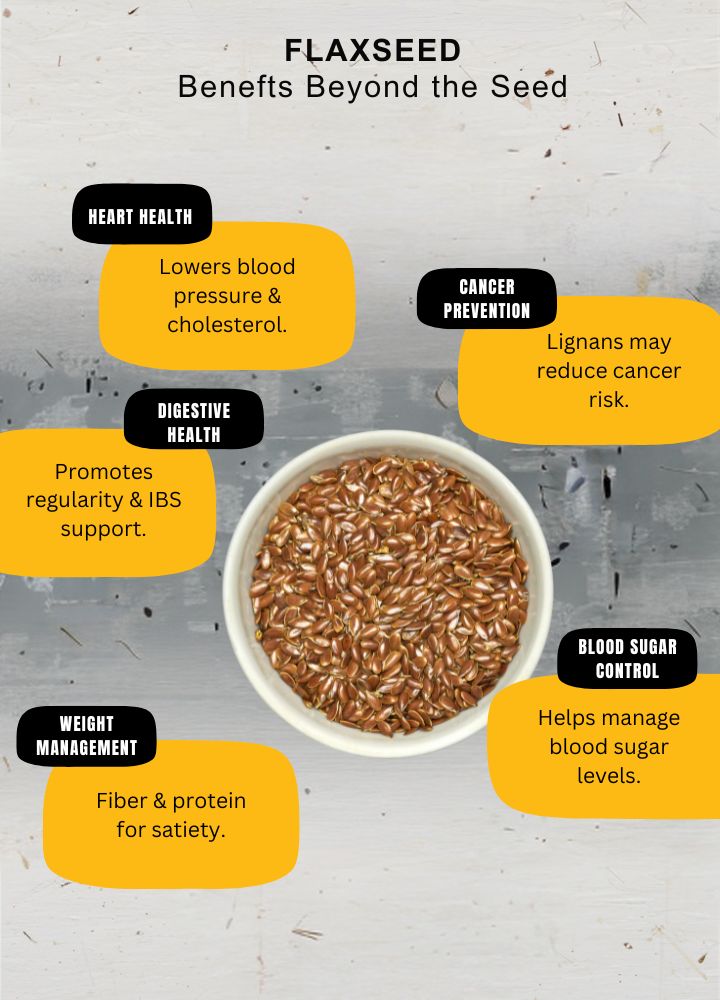Flaxseed Seeds: A humble superfood that has been quietly making waves in the nutrition community. Due to its impressive nutritional profile and health advantages, flaxseed frequently falls under the radar in favor of more glitzy superfoods.
So, grab your favorite snack (hopefully something with flaxseed!), and let’s get into the nitty-gritty of what makes flaxseed a must-have in your diet.
Table of Contents
What is Flaxseed?
Flaxseed, also known as linseed, comes from the flax plant (Linum usitatissimum), which is one of the oldest crops in the world. These tiny seeds pack a powerful nutritional punch, offering a blend of fiber, omega-3 fatty acids, and lignans that can boost your health in myriad ways.
A Treasure Trove of Nutrients
One of the most striking features of flaxseed is its nutritional composition. Let’s break it down:
- Omega-3 Fatty Acids: Flaxseeds are a rich source of ALA (alpha-linolenic acid), a type of omega-3 fatty acid that is plant-based. Omega-3s are essential for heart health, helping to reduce inflammation and the risk of chronic diseases.
- Fiber: If you’re looking to increase your fiber intake, flaxseeds have got you covered. They contain both soluble and insoluble fiber, aiding in digestion, preventing constipation, and helping you feel fuller longer.
- Lignans: Flaxseeds are high in lignans, which have antioxidant properties. Lignans may help protect against certain cancers and improve cardiovascular health.
- Protein: For a small seed, flaxseed is quite high in protein, making it a great addition to vegetarian and vegan diets.
- Vitamins and Minerals: Flaxseeds are a good source of several vitamins and minerals, including vitamin B1, magnesium, and phosphorus.
Health Benefits: Beyond Nutrition
The benefits of flaxseed extend far beyond its impressive nutrient content. Here are some of the top health benefits:
- Heart Health: Thanks to their omega-3 fatty acid content, flaxseeds can help reduce blood pressure, lower cholesterol levels, and decrease the risk of heart disease.
- Cancer Prevention: The lignans in flaxseeds have been linked to a reduced risk of breast and prostate cancer, thanks to their ability to interfere with cancer cell growth.
- Digestive Health: The fiber in flaxseeds promotes regular bowel movements and can help manage conditions like irritable bowel syndrome (IBS).
- Blood Sugar Control: Flaxseeds can help stabilize blood sugar levels, making them beneficial for people with diabetes.
- Weight Management: The combination of fiber and protein in flaxseeds can help you feel full and satisfied, reducing overall calorie intake.
How to Incorporate Flaxseed into Your Diet
Incorporating flaxseed into your diet is surprisingly easy. Here are some simple ideas:
- Smoothies: Blend ground flaxseed into your favorite smoothie for a nutrient boost.
- Baking: Add ground flaxseed to bread, muffins, and other baked goods.
- Breakfast: Sprinkle ground flaxseed over oatmeal or yogurt.
- Salads: Top your salads with a sprinkle of ground flaxseed for a crunchy texture.
Ground vs. Whole Flaxseed
While flaxseed can be consumed whole, grinding them is the best way to unlock their nutritional benefits. Whole flaxseeds may pass through your intestine undigested, meaning you won’t get all the omega-3 fatty acids and fiber they contain. Investing in a small coffee grinder can be a game-changer for incorporating flaxseed into your diet.
A Word of Caution
Flaxseeds are generally safe for most people, but like anything, they should be consumed in moderation. Because of their high fiber content, start with small amounts to prevent digestive discomfort. Also, if you are pregnant, breastfeeding, or have a hormonal-related condition, it’s best to consult with a healthcare provider before adding flaxseed to your diet.
Conclusion
Flaxseed might just be the nutritional powerhouse you’ve been overlooking. With its rich array of nutrients and health benefits, it’s an easy and affordable way to boost your health. Whether you’re looking to improve your heart health, manage your weight, or simply add more nutrients to your diet, flaxseed is a versatile and effective option. So, the next time you’re at the grocery store, don’t walk past the flaxseed; give this mighty seed a try and see how it can transform your health for the better.








